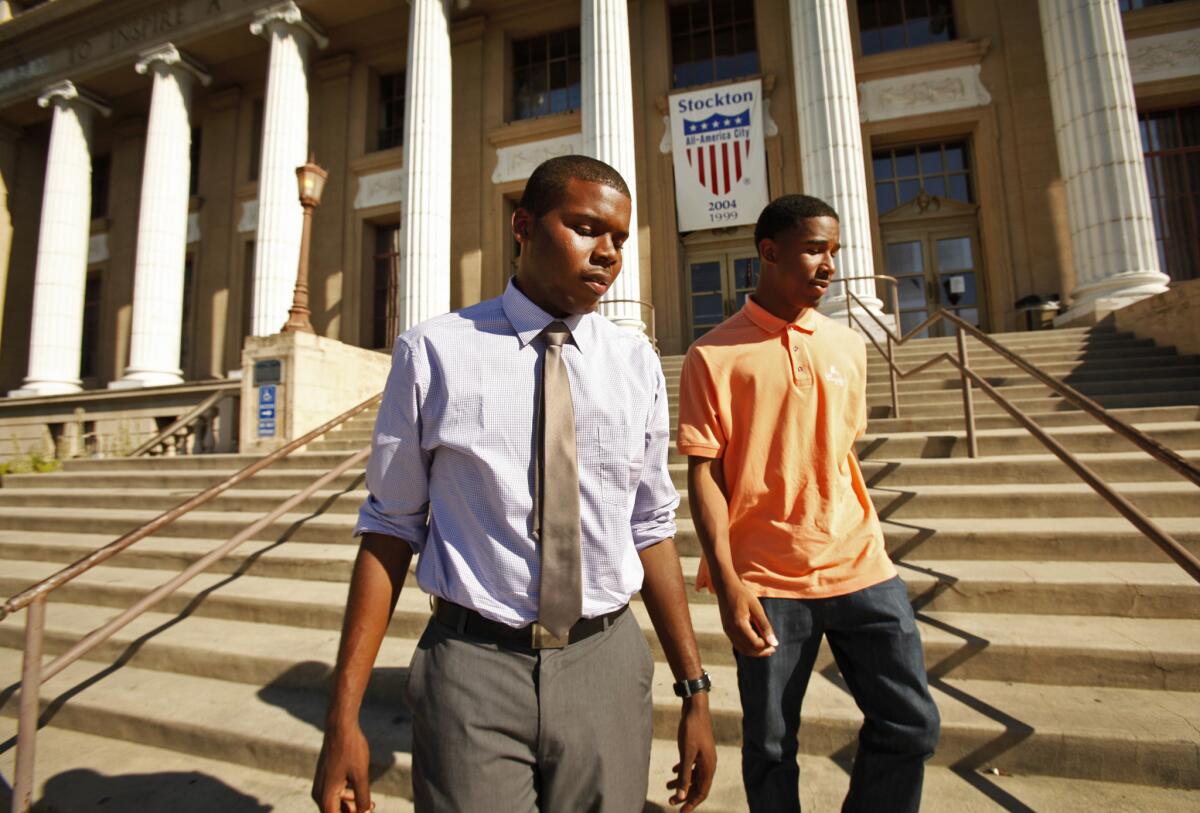Stockton voters approve new tax measure for bankrupt city

- Share via
STOCKTON -- If a measure to increase the sales tax didn’t pass, there would be few options for this crime-plagued and bankrupt city, municipal officials said.
But on Tuesday, Stockton voters agreed to an increase of 3/4 of a cent -- raising $280 million over the next 10 years to hire more police officers, support anti-crime programs and pay down debt. The tax passed 53% to 47%.
“We’re all breathing a little easier. This city came together and was willing to sacrifice so we can say ‘OK, tomorrow is going to be better,’” said Councilman Michael Tubbs, a Stanford graduate who last year returned home and won a council seat at the age of 22.
The opposing argument to the measures was simple in a city that has been battered by incompetence and poor financial decisions.
“Don’t Trust Them” - read bright yellow “Vote No” signs scattered around Stockton.
Opponents favored a restricted tax that could only be used to hire police officers. But then creditors could have argued that Stockton had proven able to raise money but refused to pay its bills, endangering the bankruptcy protection.
Despite how key the decision was to the city’s future, only 21% of registered voters went to the polls.
A little over a year ago, Stockton became the largest city in the U.S. to file for bankruptcy (a dubious standing handed to Detroit in July).
Stockton was one of the hardest hit cities during the country’s foreclosure crisis, with 1 in 10 families losing their homes. At the height of the crisis, 15% of those seeking beds at the city’s homeless shelters had once been homeowners. Entire housing tracts, built to lure Bay Area refugees, went under.
The expected tax revenue vanished and the city’s own real-estate gambles -- a marina, sports center, high-rise hotel and other redevelopment financed on credit, plummeted in value. As the city made drastic cuts, including slashing the police force by one-third, Stockton’s rate of violent crime increased.
It remains the second most violent city in California, according to FBI statistics. The financial meltdown affects everyday lives in myriad ways, from City Hall being closed on Fridays to unmowed grass and dirty water in fountains. Even with the court-approved reorganization of debt, the city was facing an expected $11-million deficit next year without the new tax.
But slowly, there have been signs of progress. The homicide rate was down 63% in the first half of the year. Stockton now has a lower foreclosure rate than the national average. Volunteers have spiffed up parks and organized walks patrolling neighborhoods.
The city filed a Chapter 9 exit plan with the Bankruptcy Court last month. Negotiations with creditors were put on hold until the vote. City officials say Stockton could now emerge from bankruptcy within two years.
The paltry turnout came despite city leaders’ warnings that if the tax didn’t pass, libraries and parks would close entirely and an already bare-bones Fire Department would suffer further cuts.
Nevertheless, Councilwoman Kathy Miller told the Stockton Record on Tuesday night that the vote revealed the character of the city.
“We’re tough. We’re kind of scrappy,” she said. “Stocktonians pull their own weight.”
ALSO:
Sunnyvale voters back gun safety measures
San Francisco high-end waterfront project defeated
Three officers injured, suspect killed in Fresno shootout
Twitter: @DianaMarcum
More to Read
Sign up for Essential California
The most important California stories and recommendations in your inbox every morning.
You may occasionally receive promotional content from the Los Angeles Times.











